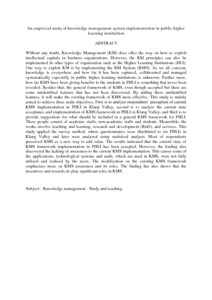Citation
Abdullah, Rusli and Selamat, Mohd Hasan and Jaafar, Azmi and Abdullah, Salfarina and Sura, Suaini
(2008)
An empirical study of knowledge management system implementation in public higher learning instituition.
International Journal of Computer Science and Network Security, vol.8 (1).
pp. 281-290.
ISSN 1738-7906
Abstract
Without any doubt, Knowledge Management (KM) does offer
the way on how to exploit intellectual capitals in business
organizations. However, the KM principles can also be
implemented in other types of organization such as the Higher Learning Institutions (HLI). One way to exploit KM is by implementing the KM System (KMS). As we all concern,
knowledge is everywhere and how far it has been captured,
collaborated and managed systematically especially in public
higher learning institutions is unknown. Further more, how far KMS have been giving benefits to the students in PHLI is
something that never been revealed. Besides that, the general framework of KMS, even though accepted but there are some unidentified features that has not been discovered. By adding these unidentified features, it will make the existing framework of KMS more effective. This study is mainly aimed to achieve three main objectives. First is to analyze respondents’ perception of current KMS implementation in PHLI in Klang Valley, second is to analyze the current state acceptance and implementation of
KMS framework in PHLI in Klang Valley, and third is to provide suggestions for what should be included in a general KMS framework for PHLI. These people consist of academic staffs, non-academic staffs and students. Meanwhile, the works involve teaching and learning, research and development (RnD), and services. This study applied the survey method, where questionnaires were distributed to six PHLIs in Klang Valley and later were analyzed using statistical analysis. Most of respondents perceived KMS as a new way to add value. The results indicated that the current state of KMS framework
implementation in PHLI has been accepted. However, the finding also discovered the lacking of awareness to the current KMS implementation. This causes some of the applications, technological systems and audit, which are used in KMS, were not fully utilized and realized by the users. The modification on the existing KMS framework emphasizes more on KMS awareness and its roles. The finding has also shows that the incentives and rewards do play significant roles in KMS.
Download File
![[img]](http://psasir.upm.edu.my/13029/1.hassmallThumbnailVersion/An%20empirical%20study%20of%20knowledge%20management%20system%20implementation%20in%20public%20higher%20learning%20instituition.pdf)  Preview |
|
PDF (Abstract)
An empirical study of knowledge management system implementation in public higher learning instituition.pdf
Download (183kB)
| Preview
|
|
Additional Metadata
Actions (login required)
 |
View Item |

